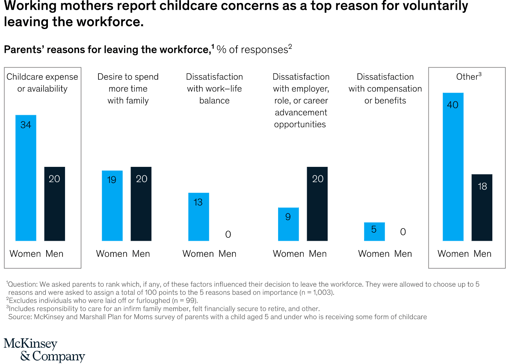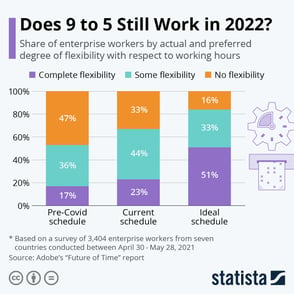Note: Katie Burke, Chief People Officer at HubSpot was interviewed by Kevin Delaney, CEO & Editor in Chief of Charter Works, Inc. on June 8th at the 2022 EmTech Next conference.
Flexible and Hybrid Work: Learned Learned
The status quo work culture no longer works for most families.
--- Sarah Gitlin, Ayushi Gummadi, Alexis Krivkovich, Kunal Modi -- McKinsey
Listen to the conversation as Katie Burke discusses Flexible and Hybrid Work arrangements.
Question: Hubspot was one of the earliest and most thoughtful companies in terms of adopting flexible and hybrid work. What have you learned so far and what are the key takeaways.
Answer: We've learned a lot. Prior to the pandemic, HubSpot had about 10 employees working remote. But like so many organizations, our path to hybrid was massively accelerated by the global pandemic.
Lesson 1. Everyone's work experience is incredibly personal. One of the things is people have viscerally emotional responses to how and where they want to work. One thing we did early in the pandemic was we understood that your experience of how you thought your team might want to work might be different than mine and might be shaped by personal experiences.
We had people say, "I worked as a young sales rep and I needed that training and I needed that whole bullpen environment and so remote will never work. We had some people who said, "I want to protect my team and I want to make the call based on how long someone's worked at the company or how talented I think they are." One of the things I always recommend that people do is take your personal opinions out of it and ask the experts. So the panels that we brought in were recent graduates, senior candidates, experts in diversity and inclusion, and belonging experts and compensation benefits. Having those panels and learning as an executive team allowed us to distance ourselves from our own personal opinions and actually make better informed decisions that would work for our workforce.

Lesson 2. The second learning is to ask yourself, "Who work was working for before." Oftentimes you'll hear people say the office worked wonderfully. So one of our big tenets at HubSpot is we care deeply is diversity and inclusion belonging. It turns out that for caregivers, for women, for working parents, the old way of commuting for people with disabilities, the old way of commuting into work, and traditional workplace places weren't working. One of our learnings is just making sure that our path to hybrid and our path to equity are irrevocably linked as far as how we think about them.
Lesson 3. The third learning is humility. I stand here before you as someone who has learned a ton and who is still very much figuring things out. I am immediately distrustful of anyone who says we've got it all figured out. We're crushing it on this front. So, just know that I come here with immense humility and we're still learning.
Workforce Choices:
"In today's post-pandemic world, flexibility is key, and taking precautions to safeguard your business against unforeseen change is imperative. Offering solutions that include options for hybrid and remote work can play a big part in being successful in said efforts. This can help not only in maintaining day-to-day operations, but increasing morale amongst both employees and customers, alike." -- Rachael, Information Management Graduate Student
HubSpot now has over 5,000 employees, is that right? Just under 7,000 in 13 countries. You've given employees the choice of three options right so and what percentage roughly are in each of those buckets. Over 50% of our employees have chosen homes. The majority have chosen to work fully remote for the first time in Hubspot history. This is the first time the majority of folks have chosen not to enter the office on a regular basis. Not surprisingly, the next biggest majority are people who are flex. They want the best of both worlds. I happen to be a flex employee so I'm a little bit biased on this front. Roughly 11% are picking office. We still have some folks who love going to the office, who love the distance that it creates between their work life and their home life, and we honor and respect that, too. What we're seeing that that at-home percentage of people is here to stay. We're investing heavily in making sure their experience scales while at the same time acknowledging that some people love coming into the office and we celebrate that too.
42% of employees with a remote work option plan to work remotely more often in the next five years. -- Owl Labs
People chose for this year and then you'll revisit it. The way that HubSpot decided to do this is a little bit like annual enrollment here in the U.S. You pick your benefits package. One of the things we wanted to do was systematize and automate our preferences and make sure we align things like our remote stipends our remote meetups. People choose their work preference once a year along with their other benefits. But they also have the option to choose that - so let's say, as an example, you and your partner choose to move and relocate - relocation is a good reason to change your work preference as is some sort of life event those are both honorable reasons. We don't want people changing every two weeks for like arbitrage opportunities.
Are there things that you thought assumed tried that turned out not to be true?
I would say I have last count. One of the assumptions that we made we heard loud and clear that remote work would resonate more in certain regions than others. So, one thing that really took us back was the percentage of folks who picked home in Singapore. For those who visited Singapore, you know that it's not a very large island. So commute times are not the prevailing factor that would prevent someone to come in and yet we're seeing people choose to work at home because they just found the flexibility that they prefer.
I would say 1) was assumptions around geography; 2) was assumptions around what younger workers necessarily want. One of the things we saw was a lot of our recent grads picked flex because they want the best of both worlds and want that optionality and 3) is how and when people want to come together. That's one thing I think everyone is still figuring out. What does it look like to really connect with meaningful purpose, for what reason, how do we make sure when we're connecting it's partially social but also partially work related.
So, I would say that's the stuff we're tweaking and working on.
Additional Information to Explore:
- 40 Remote Work Stats to Know in 2021
https://blog.hubspot.com/marketing/remote-work-stats - Managing Flexible Work Arrangements:
https://www.shrm.org/resourcesandtools/tools-and-samples/toolkits/pages/managingflexibleworkarrangements.aspx - 8 Types of Flexible Work Arrangements Explained
https://www.viewsonic.com/library/business/8-types-of-flexible-work-arrangements-explained/ - Is 9 to 5 working in 2022?
https://www.statista.com/chart/27260/is-9-to-5-working-in-2022/ - The childcare conundrum: How can companies ease working parents’ return to the office?
https://www.mckinsey.com/featured-insights/sustainable-inclusive-growth/future-of-america/the-childcare-conundrum-how-can-companies-ease-working-parents-return-to-the-office - As telework continues for many U.S. workers, no sign of widespread ‘Zoom fatigue’
https://www.pewresearch.org/fact-tank/2022/05/04/as-telework-continues-for-many-u-s-workers-no-sign-of-widespread-zoom-fatigue/
“Students who join Agency M-1 gain invaluable insight working with real businesses to gain hands-on experience before leaving school. They build connections with executives in the business community and, in many cases, set the path for the beginning of a rewarding digital career.”
-- Brian Meek
Please consider following us on Social Media.
Also, enhance your LinkedIn profile as gain these skills and then apply them in a micro-internship! Learn how!
